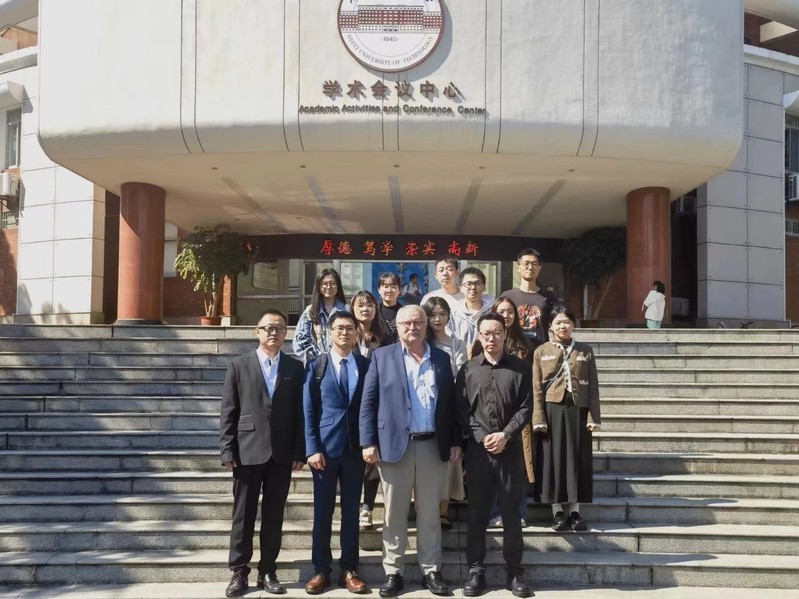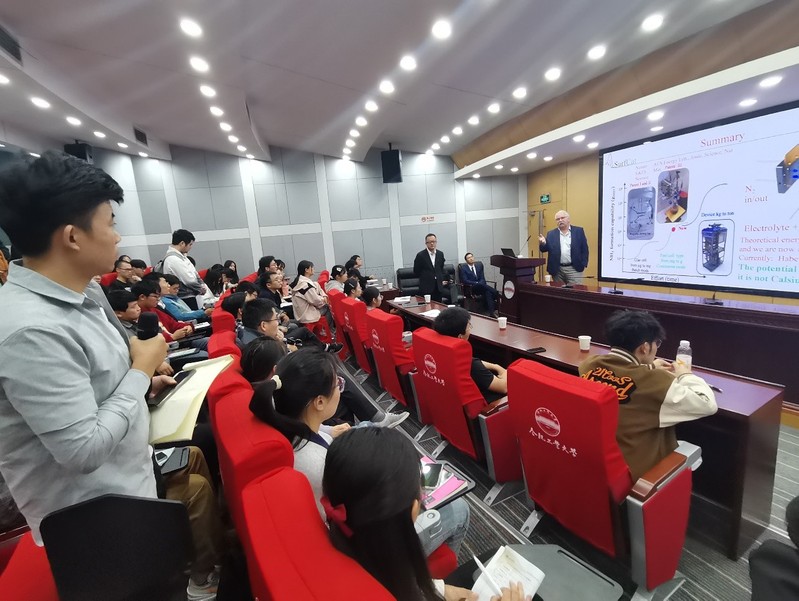On the morning of October 21st, Professor Ib Chorkendorff, a member of the Physics Department at the Technical University of Denmark, was invited to our institution for academic lecture. The event took place at the second-floor lecture hall of the Academic Conference Center on Tunxi Road campus, hosted by Professor He Tao, Vice Dean of the School of Chemistry and Chemical Engineering. Approximately 100 faculty and students from the School of Chemistry and Chemical Engineering, the School of Materials Science and Engineering, and other institutions attended the academic presentation.
Professor Ib Chorkendorff delivered a lecture on "Electrochemical Ammonia Synthesis." Firstly, he emphasized the importance of synthesizing ammonia. Then, addressing the challenges of the current Haber-Bosch method for ammonia synthesis, he introduced the electrochemical synthesis of ammonia. This approach involves using renewable energy for power generation and directly electrochemically synthesizing ammonia from nitrogen and water. This method enables distributed synthesis of ammonia in small-scale facilities. Professor Chorkendorff then presented rigorous characterization methods for electrochemical ammonia synthesis developed by his research group over nearly two decades.
His team discovered a uniformly dense solid electrolyte layer rich in LiF induced by a lithium hexafluoroborate electrolyte. Under 20 bar N2, the current density reached 1 A cm-2, and the NH3 yield was 2.5±0.1 µmol s-1 cm-1, with a Faraday efficiency of 71%±3%. Additionally, they developed a platinum catalyst for the stable catalysis of hydrogen gas oxidation in organic solvents. Using a flow electrolysis cell under ambient conditions, they achieved a Faraday efficiency of 61% and an energy efficiency of 13%. Finally, Professor Chorkendorff summarized the achievements of his research group in recent years in the field of electrochemical ammonia synthesis, highlighting current major challenges and opportunities.
After the lecture, Professor Ib Chorkendorff engaged in lively discussions and exchanges with the attending teachers and students regarding technical challenges in the field of electrochemical ammonia synthesis.
Ib Chorkendorff is a professor in the Physics Department at the Technical University of Denmark and a member of the Royal Danish Academy of Sciences. He obtained his doctoral degree from the University of Odense, Denmark, in 1985, and conducted postdoctoral research at the University of Pittsburgh in the United States. He joined the Technical University of Denmark in 1987 and was promoted to full professor in 1999. From 2005 to 2016, he served as the director of the Center for Individual Nanoparticle Functionality (CINF) of the Danish National Research Foundation. Since 2016, he has been the director of the Villum Center for the Science of Sustainable Fuels and Chemicals (V-SUSTAIN). He has published over 400 academic papers, holds 23 patents, and authored the book "Introduction to Modern Catalysis and Kinetics." Since 2017, he has been recognized as a highly cited scientist (ISI) in the top 1% of his field. Professor Chorkendorff's research focuses on using surface science methods to study heterogeneous catalytic processes, including thermal catalysis, electrocatalysis, and photocatalysis, with an emphasis on finding new catalysts to improve the efficiency of sustainable energy production and conversion while promoting environmental protection. Additionally, he is a co-founder of three startup companies: RENCAT APS, HPNOW APS, and Spectroinlets APS. Professor Chorkendorff has received numerous awards, including the prestigious 2021 Vilhelm Kragh Møller Annual Award (Denmark's most prestigious award) and the 2022 Eni Award (Energy Frontiers Award).
(Zheng Yarong, Zhang Jiale / Text and Images; He Tao, Cong Huaiping / Review)




 Links
Links